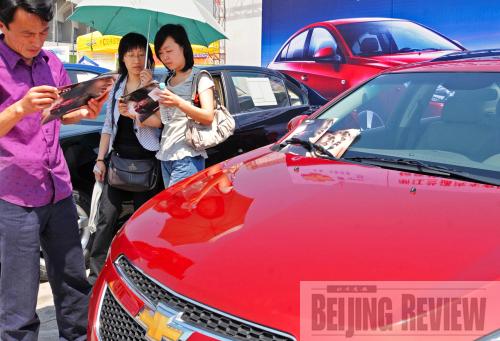|
 |
|
BRAND CONFIDENCE: Prospective car buyers examine GM models at a dealership in Hangzhou, Zhejiang Province, in May (TAN JIN) |
The cliché "like father, like son" may well be applied to some parent companies and their offspring, but it does not necessarily ring true when it comes to auto titan General Motors Corp. (GM) and its Chinese subsidiary.
A day after its parent company filed for bankruptcy protection on June 1, GM China stated its desire to obtain a bigger slice of the country's fast-growing auto pie. The company aims to introduce 30 new models here and double its current annual sales to reach 2 million vehicles within five years, said Kevin Wale, President of GM China, in a statement. He added that the firm might build a new factory in China to help achieve the target-a striking contrast to GM's overcapacity ailments in the United States where the parent company plans to close or idle several plants.
Nearly everyone following the GM case is asking the same question: Can the auto giant still fare well in China at a time when its parent is struggling at the edge of a total collapse? Probably yes.
GM's bankruptcy filing only covers its U.S. operations and assets, leaving its presence in China largely intact. The quick sale of loss-making brands and equipment will allow a much smaller and leaner company to emerge from court protection. As part of GM's prime assets, its China subsidiary and interest in local joint ventures will likely be absorbed into the "new GM."
As the largest overseas carmaker in the country, GM China dominates the van and pick-up markets through a three-way partnership with Shanghai Automotive Industry Corp. (SAIC) and Liuzhou Wuling Automobile Co. Ltd., and runs Shanghai General Motors Co. Ltd., a separate venture car manufacturer with SAIC.
After years of torrid growth, the profit-generating ventures have been largely technologically and financially self-sufficient, and are in a good position to weather the growth-retarding shock emanating from the United States.
"Our partnerships with auto parts suppliers and dealers have remained unaffected by the GM crisis," said Ding Lei, General Manager of Shanghai GM, in an interview with China Securities Journal. Other businesses, including new product development, are also progressing as normal, he added.
Chen Hong, President of SAIC, said in a statement that he was confident GM would be able to navigate through the bankruptcy proceedings and regain its health in the foreseeable future.
Analysts believe the painful restructuring will prompt the new GM to focus more on the vibrant and profitable Asian markets as sources of growth. China, in particular, is emerging as a new battlefield for global auto titans, they said.
Unlike the fuel-guzzling trucks and sport utility vehicles churned out by its U.S. plants, GM China has been dedicated to producing more fuel-saving and energy-efficient models in the past years. It is now building a research and development center in Shanghai to study forward-looking technologies, including new automobile energies and emissions reduction. In a country where environmental issues have become a top national priority, such a "green" strategy is getting into full swing.
Incentives to buy
In the meantime, the automaker is receiving a boost from a number of government incentives. Halving the sales tax on purchases of low-emission cars and reducing the retail price of refined oil released some of the pent-up consumer demand. The elimination of certain road toll charges also brought some potential buyers to the table. Regardless of the parent company's miseries at home, GM China, together with its local joint ventures, sold 671,148 vehicles from January to May this year, a 33.8-percent increase over the same period last year and well above the sector's average sales growth increase of 18.8 percent.
"We will press ahead with the development of environmentally friendly models such as hybrid electric vehicles as a reflection of our consistent commitment to the Chinese market," Wale said.
Huang Yonghe, chief auto expert at the China Automotive Technology and Research Center, told Xinhua News Agency there are no signs that cash-rich GM China is feeling the pain of the parent company.
"The creation of a stronger new GM will also put a floor under its long-term prospect in the buoyant Chinese market," he said.
Zhang Xiaoyu, Executive Vice President and Secretary General of the China International Institute of Multinational Corporations, echoed Huang's opinion. Nascent domestic automakers still have a long way to go before they can pose a threat to GM, he said.
Analysts pointed out that the only impact on GM China, if any, might be a dent in consumer confidence. Although it has recently launched an advertising campaign to reassure Chinese customers of its financial health and after-sale services, GM China still has much to do to erase misunderstandings about the bankruptcy filing and protect its brand loyalty, they said.
Guo Liwei, a sales agent at Chivast Education International Co. Ltd. in Beijing, told Beijing Review that he had planned to buy a GM Chevrolet model in several weeks, but has decided to wait a bit longer to see how the bankruptcy protection plan plays out. | 